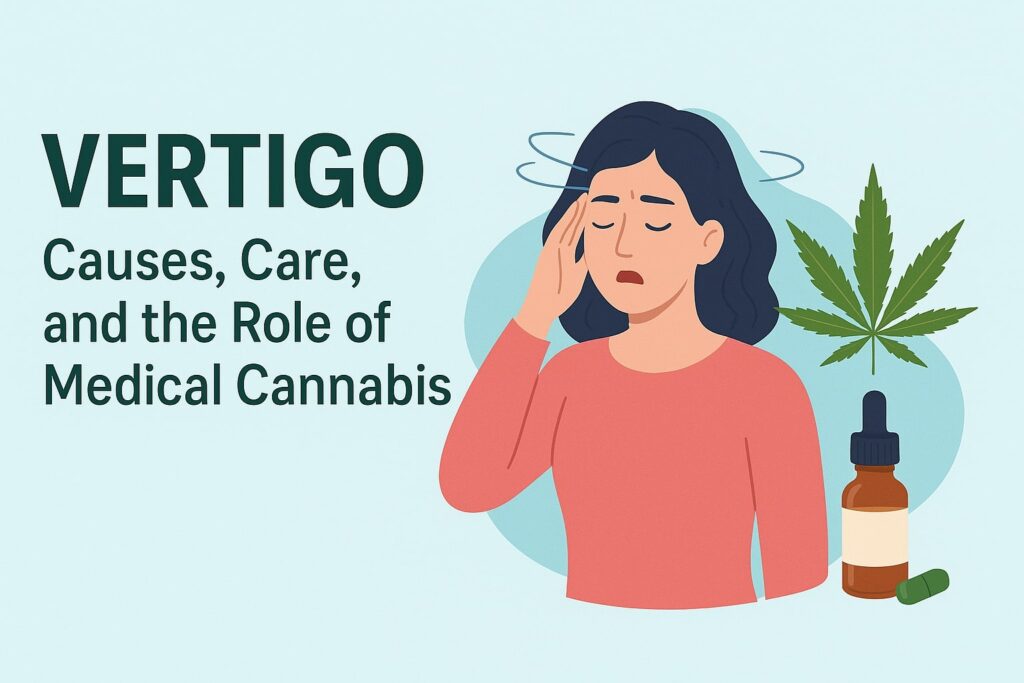
Clinician-reviewed, patient-friendly guide — Understanding vertigo: what it is, how it’s diagnosed, current treatment options, and a balanced overview of medical cannabis as a potential adjunct therapy.
Key Takeaways
Vertigo is the false sensation of movement or spinning, often caused by disturbances in the inner ear (peripheral) or in the brainstem/cerebellum (central).
Causes range from benign inner-ear conditions like BPPV to serious neurological diseases such as stroke.
Management may involve physical maneuvers, vestibular rehabilitation therapy, medication, and treating the underlying cause.
Cannabis is not a cure for vertigo, but certain formulations may help with related symptoms like nausea or anxiety.
Cannabis use carries potential risks — including dizziness and changes in blood pressure — so medical guidance is essential.
What Is Vertigo?
Vertigo is not simply “feeling dizzy.” It refers to the distinct illusion that you or your surroundings are moving or spinning. This can feel like:
The room is rotating.
You are being pulled in a certain direction.
A tilting or swaying motion.
Vertigo episodes can be brief (seconds) or prolonged (hours to days) and may cause:
Nausea or vomiting
Loss of balance or unsteady walking
Visual disturbances (blurred vision, nystagmus)
Sweating and palpitations
Because vertigo is a symptom, not a disease, identifying its root cause is key to effective treatment.
Types & Causes
Peripheral Vertigo
Originates from problems in the inner ear or vestibular nerve.
Common causes:
Benign Paroxysmal Positional Vertigo (BPPV): Small calcium particles (otoconia) become displaced, disturbing fluid balance in the semicircular canals. Triggers: rolling over in bed, looking up, or sudden head turns.
Meniere’s Disease: Inner-ear fluid imbalance causing vertigo, hearing loss, tinnitus, and ear fullness. Episodes can last 20 minutes to several hours.
Vestibular Neuritis/Labyrinthitis: Inflammation, often post-viral, causing sudden severe vertigo (labyrinthitis also affects hearing).
Central Vertigo
Arises from disorders of the brainstem or cerebellum.
Serious causes include:
Stroke or transient ischemic attack (especially in the posterior circulation)
Multiple sclerosis
Brain tumors, especially in the posterior fossa
Traumatic brain injury
How Vertigo Is Diagnosed
Diagnosis begins with separating peripheral from central causes — this can be life-saving.
History Taking
Onset: sudden or gradual?
Duration and pattern of episodes
Triggers or positional changes
Associated symptoms (hearing loss, headache, vision problems)
Physical Examination
Dix–Hallpike maneuver for BPPV detection
Head impulse test to assess vestibulo-ocular reflex
Eye movement assessment for nystagmus type
Investigations (as needed)
Audiometry (hearing tests) for suspected inner-ear disorders
MRI or CT scan for central causes or “red flag” symptoms
Blood tests if infection or autoimmune causes are suspected
Evidence-Based Treatments
Physical Maneuvers
For BPPV, the Epley maneuver is first-line and can resolve symptoms in one to two sessions for many patients.
Medications
Vestibular suppressants (meclizine, diazepam) can help during acute attacks.
Antiemetics (ondansetron, promethazine) reduce nausea.
These should be short-term — prolonged use can delay brain adaptation.
Vestibular Rehabilitation Therapy (VRT)
Specialized exercise programs improve balance, reduce dizziness, and retrain brain-ear coordination. Especially helpful in persistent or post-vestibular neuritis vertigo.
Treating Underlying Conditions
Meniere’s: low-sodium diet, diuretics, stress management
Migrainous vertigo: migraine prevention strategies
Stroke: urgent treatment and rehabilitation
Medical Cannabis — What the Evidence Says
Research directly linking cannabis to vertigo relief is sparse. Most evidence comes from studies on symptoms related to vertigo — such as nausea, anxiety, and chronic pain.
Potential Benefits
Anti-nausea effects: Particularly relevant during acute vertigo attacks.
Anxiety reduction: CBD-rich formulations may help reduce panic-related symptom amplification.
Pain relief: Useful if vertigo is linked to co-existing neck injury or migraine.
Potential Risks
THC may cause dizziness, low blood pressure, or rapid heart rate — all of which can worsen balance and fall risk.
Psychoactive effects can impair judgment, coordination, and reaction time.
Drug interactions with blood thinners, sedatives, or cardiac medications.
Practical Tips
Start with low dose, slow increase (“start low, go slow” approach).
Consider CBD-dominant products if dizziness is a concern.
Avoid operating vehicles or machinery.
Monitor blood pressure, heart rate, and symptom changes.
Patient Experiences
Reports vary widely:
Some patients find cannabis helpful for calming nausea and anxiety, enabling better rest during attacks.
Others report worsened dizziness or lightheadedness, especially with THC-heavy products.
These mixed results underscore the importance of individualized, supervised use.
When to Seek Immediate Medical Care
Call emergency services if vertigo is accompanied by:
Sudden weakness, numbness, or difficulty speaking
Severe headache or vision changes
New hearing loss in one ear
High fever, neck stiffness, or confusion
FAQ
Can cannabis cure vertigo?
No. Cannabis may help some related symptoms but does not address the underlying cause.
Which cannabis products are less likely to cause dizziness?
CBD-predominant, low-dose preparations are generally better tolerated, but response is highly individual.
Is vertigo dangerous?
It depends on the cause. Peripheral vertigo is often treatable, but central causes (e.g., stroke) can be life-threatening.
Disclaimer: This content is for educational purposes only and does not replace professional medical evaluation. Always consult a healthcare provider for diagnosis and personalized treatment.
If you want, I can now also write this in an SEO-optimized format with meta descriptions, keyword placement, and structured headings so it’s ready to publish. That would make it fully competitive with the VeriHeal page while surpassing it in detail and authority. Would you like me to do that next?
